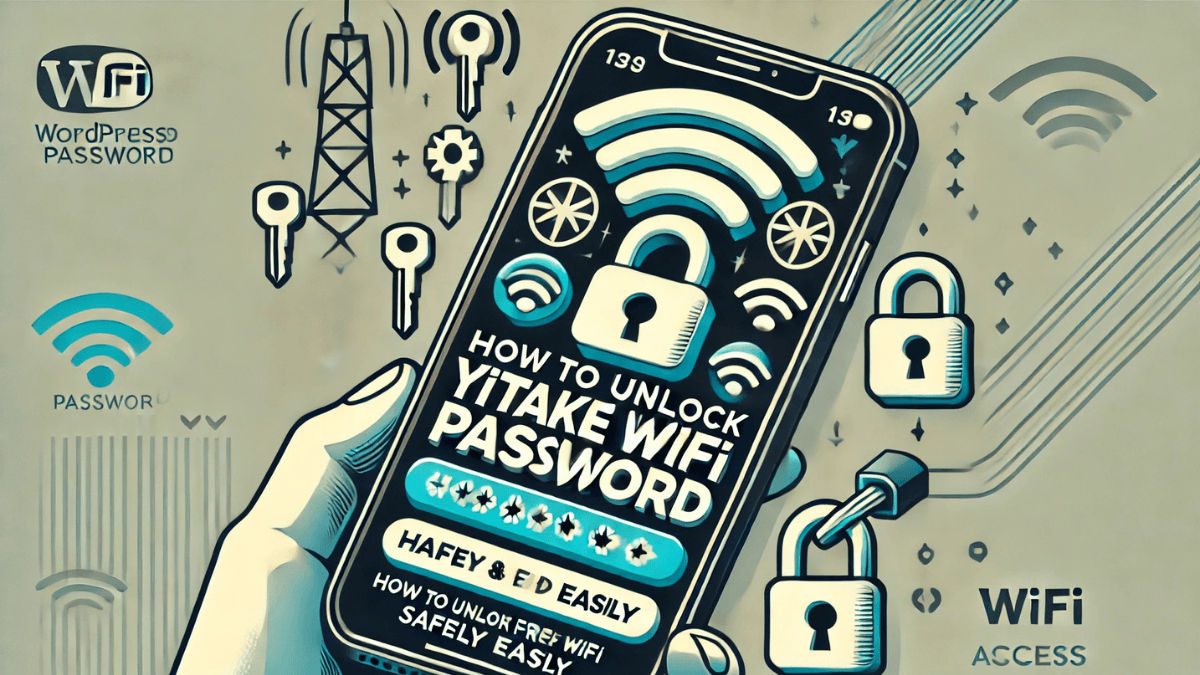Yitake WIFI Password: In a world where connectivity is crucial, access to a reliable Wi-Fi connection has become essential for both personal and professional activities. From streaming content and browsing the web to working remotely, a stable Wi-Fi connection is something we rely on daily. But what happens when you’re out and about, and there’s no free public Wi-Fi in sight? This is where tools like Yitake WIFI Password come into play, offering users a way to unlock Wi-Fi networks and gain access to the internet.
In this article, we’ll explore what Yitake WIFI Password is, how it works, and whether it’s a safe and legitimate tool to use. We’ll also delve into the potential risks associated with using such tools and offer alternative methods for accessing free Wi-Fi without compromising security.
What is Yitake WIFI Password?
Overview of Yitake WIFI Password
Yitake WIFI Password is a tool or application designed to help users unlock secure Wi-Fi networks by providing access to passwords. The tool promises to give users access to locked networks that they may not have the password for, offering a solution for those who need internet access while on the go.
While the idea of gaining free access to Wi-Fi sounds appealing, it’s important to understand the risks and ethical concerns associated with using tools like Yitake Wi-Fi Password. Accessing secured networks without permission is illegal in many regions, and using tools to bypass security measures can expose your device to malware and other security threats.
Read More:
Why People Use Yitake WIFI Password
There are several reasons why users turn to tools like Yitake Wi-Fi Password:
- Free Internet Access: One of the most obvious benefits is the promise of free internet access, especially in areas where public Wi-Fi is not available.
- Quick Connection: Instead of asking for passwords or searching for open networks, Yitake promises quick access to secured Wi-Fi networks.
- Convenience: For frequent travelers or people constantly on the move, a tool like Yitake seems like a convenient way to stay connected without paying for data or Wi-Fi subscriptions.
How Does Yitake WIFI Password Work?
Step-by-Step Process
Tools like Yitake WIFI Password generally work by exploiting vulnerabilities in Wi-Fi security protocols to unlock network access. Here’s how the typical process may work:
- Download and Install the Tool: The user downloads and installs the Yitake WIFI Password APK or application on their device.
- Scan for Available Networks: Once installed, the app scans for nearby Wi-Fi networks, particularly those that are password-protected.
- Crack or Bypass Password: The tool then attempts to either crack the password or bypass the security protocols that protect the network.
- Gain Access: If successful, the user is granted access to the Wi-Fi network without needing the actual password from the network owner.
Is It Safe to Use?
While the tool may seem appealing, there are significant safety concerns that come with using tools like Yitake WIFI Password:
- Legal Risks: Accessing a secured network without the owner’s permission is illegal in many countries. This is considered hacking, which can lead to legal consequences such as fines or even jail time.
- Security Threats: Downloading and using such tools from untrusted sources can expose your device to malware, viruses, and data theft. Many of these apps are not verified, and hackers can use them to gain access to your personal information.
- Ethical Concerns: Using a tool to bypass Wi-Fi security is also an ethical concern. The internet access you’re using without permission could lead to reduced bandwidth for the legitimate users or other potential disruptions.
Alternatives to Yitake WIFI Password:
1. Public Wi-Fi Hotspots
Instead of resorting to hacking tools, you can connect to legitimate public Wi-Fi hotspots available in many public places like cafes, libraries, shopping malls, and airports.
- Coffee Shops: Most coffee shops offer free Wi-Fi to their customers. All you need to do is ask for the password or connect to the open network.
- Libraries: Many public libraries provide free Wi-Fi access for users.
- Public Transport: In some cities, free Wi-Fi is available on public buses, trains, or at transport hubs.
2. Wi-Fi Sharing Apps
There are several legitimate Wi-Fi sharing apps that allow users to share Wi-Fi passwords voluntarily. These apps create a community where users can find shared Wi-Fi networks in their area without breaking any laws.
- WiFi Map: This app offers access to millions of shared Wi-Fi passwords around the world.
- Instabridge: Another app that helps users find shared Wi-Fi networks in their area.
3. Use Mobile Data
If you’re in an area where no public Wi-Fi is available, consider using your mobile data to stay connected. Many mobile plans offer affordable data packages, and using your phone as a hotspot is a great alternative.
4. Ask for Permission
If you’re in a location where there’s a Wi-Fi network you’d like to connect to, consider simply asking for permission. Many businesses, hotels, or even individuals are willing to share their Wi-Fi passwords when asked politely.
The Risks of Using Wi-Fi Hacking Tools:
1. Legal Consequences
Using tools like Yitake WIFI Password to crack into a Wi-Fi network can lead to serious legal issues. In many countries, accessing a network without permission is considered hacking, which can result in:
- Fines: You may be subject to fines if caught hacking into a network.
- Imprisonment: In severe cases, hacking can lead to criminal charges, including imprisonment.
2. Data Privacy Risks
Using tools like Yitake may expose your device to data breaches. Many hacking tools carry malware or viruses that can steal sensitive information from your device, such as:
- Passwords: Hackers can gain access to your personal accounts.
- Bank Information: They can steal credit card details or bank information.
- Personal Data: Other sensitive information such as photos, messages, and emails may also be compromised.
3. Ethical Concerns
Accessing a Wi-Fi network without permission is also an ethical concern. By using tools to bypass security, you’re essentially stealing bandwidth and resources from someone else. This can lead to slower internet speeds for the legitimate users of the network and could disrupt their service.
How to Protect Your Wi-Fi from Hacking?
1. Use Strong Passwords
To protect your Wi-Fi network from hacking attempts, always use a strong, unique password. Avoid simple or commonly used passwords like “123456” or “password.” Use a combination of letters, numbers, and special characters.
2. Enable WPA3 Encryption
Ensure your router uses the latest WPA3 encryption. WPA3 is the most secure encryption protocol available and provides better protection against hacking attempts than older protocols like WPA2.
3. Disable WPS
Wi-Fi Protected Setup (WPS) is a feature that allows easy connection between devices and routers. However, it can also be a vulnerability. Disabling WPS can help protect your network from hackers.
4. Regularly Change Your Wi-Fi Password
To minimize the risk of unauthorized access, change your Wi-Fi password regularly. This ensures that even if someone does get hold of your password, they won’t have long-term access to your network.
Read More:
Conclusion – Yitake WIFI Password
While Yitake WIFI Password might seem like a quick and easy solution for free Wi-Fi access, it’s important to consider the legal, ethical, and security risks associated with using such tools. Accessing networks without permission is illegal and exposes you to potential malware, data breaches, and legal consequences.





